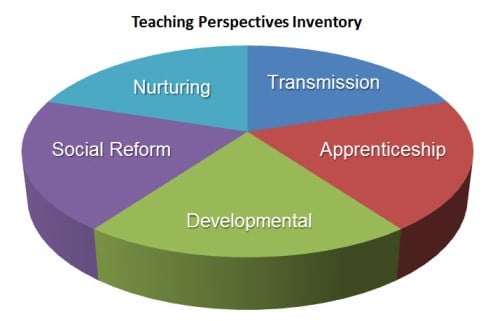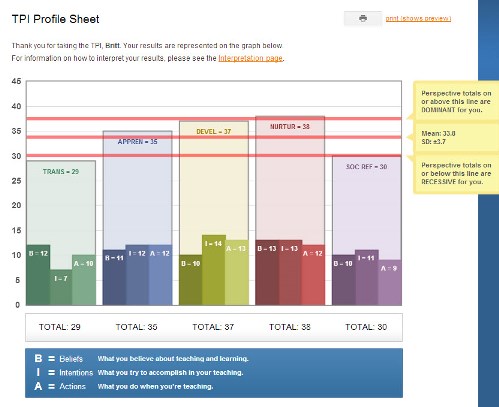This morning, Jeffrey Nugent, Laura Gogia and I met to debrief last night’s GRAD-602 class, and decided to discuss our perspectives on teaching as a podcast. Last night in class, our students had shared their results in taking the Teaching Perspective Inventory, and the three of us had conducted that activity as well. The dominant perspective in our room was Apprenticeship (11), followed by Developmental and Nurturing (6 each), Transmission (4), with none in the perspective of Social Reform. Our students also shared traits of teachers who had made a difference in their lives, and this surfaced some tensions between the desire for humanistic ideals and the realities of institutional pressures.
With that as a backdrop, we each noted in this podcast a teacher in the past who had an impact on our lives, and then explored further how our perspectives can serve as a lens for articulating our philosophy of teaching and learning.
Have a listen…
.
By the way, my own TPI results had Nurturing as the dominant perspective, with Transmission and Social Reform as recessive.
On the Teaching Perspectives Inventory website, my dominant perspective is interpreted as follows:
“Effective teaching assumes that long-term, hard, persistent effort to achieve comes from the heart, not the head.
People become motivated and productive learners when they are working on issues or problems without fear of failure. Learners are nurtured in knowing that (a) they can succeed at learning if they give it a good try; (b) their achievement is a product of their own effort and ability, rather than the benevolence of a teacher; and (c) their learning efforts will be supported by both teacher and peers. Good teachers care about their students and understand that some have histories of failure resulting in lowered self-confidence. However they make no excuses for learners. Rather, they encourage their efforts while challenging students to do their very best by promoting a climate of caring and trust, helping people set challenging but achievable goals, and supporting effort as well as achievement. Good teachers provide encouragement and support, along with clear expectations and reasonable goals for all learners but do not sacrifice self-efficacy or self-esteem for achievement. Their assessments of learning consider individual growth as well as absolute achievement.”
I plan to update my “Philosophy of Teaching” this semester as this course unfolds, and this exercise has given me some fodder to chew on. Through what perspective(s) do you view teaching?


Interesting exercise. I was not surprised with my results. I teach writing so really we touch on quite a few subject areas related to students’ real life situations and work. It’s vital that students apply what they learn in my classes to their school and work. I value critical and creative thinking highly in all the classes that I teach. So it stands to reason that the areas of developmental and apprenticeship were the highest perspective in my teaching.
Totals:
Developmental = 43
Apprenticeship = 40
Nurturing = 35
Transmission = 33
Social Reform = 27
Effective teaching must be planned and conducted “from the learner’s point of view.”
Good teachers must understand how their learners think and reason about the content. The primary goal is to help learners develop increasingly complex and sophisticated cognitive structures for comprehending the content. The key to changing those structures lies in a combination of two skills: (1) effective questioning that challenges learners to move from relatively simple to more complex forms of thinking, and (2) ‘bridging knowledge’ which provides examples that are meaningful to the learner. Questions, problems, cases, and examples form these bridges that teachers use to transport learners from simpler ways of thinking and reasoning to new, more complex and sophisticated forms of reasoning. Good teachers adapt their knowledge to learners’ levels of understanding and ways of thinking.
Nice summary, Britt!
I enjoyed the TPI exercise and the pursuant discussion in GRAD 602…but like I alluded to in our Podcast and pre-Podcast discussion, I continue to wonder about how novice teachers respond to the TPI. For example, check out http://cke602blog.wordpress.com/ . Although “transmission” is couched in positive terminology in the TPI descriptions, I don’t think it’s out in left field to argue that it is the “black sheep” of the modern andragogy/pedagogy world–in reaction to the historical connection between transmission and instructor-centered learning. Some novice teachers who take classes like Grad602 find themselves squarely in the transmission position, against their true nature or will. Why? My pet theory is that as expert students (as most novice teachers were/are), they did many many presentations. Think about it…as a student, how often are you called upon to “teach” you classmates? Rarely. Instead, you are asked to give a 10 minute presentation on something and graded for your powerpoint and presentation skills. So when the expert student transitions to a novice teacher, many of them are going to do what they do well…PRESENT a POWERPOINT, which very easily falls into the category of transmission, doesn’t it? For the conscientious expert student/novice teacher, finding that they have a “transmission” dominance can be frustrating or saddening in the context of the other underlying messages they hear from pedagogical specialists. I think we need to support these students, and offer PRACTICAL ways to help them move from transmission to other domains of teaching if they want to do so.
@Laura Gogia The idea that… “the conscientious expert student/novice teacher, finding that they have a “transmission” dominance can be frustrating or saddening in the context of the other underlying messages they hear from pedagogical specialists. I think we need to support these students, and offer PRACTICAL ways to help them move from transmission to other domains of teaching if they want to do so.”…caught my attention.
I’d like to add to this idea by noting that the dominant perspective does not erase or diminish the scores on the other perspectives in the TPI…we ALL carry some commitment to each of them. The five perspectives, taken collectively, provide a meaningful way to begin understanding our perspectives on teaching in a more holistic way. It seems to me, that engaging in open conversation about our perspectives on teaching, asking questions, and being reflective is perhaps one of the more important – and practical – things we can do to support folks in beginning to navigate the terrain of the life of a teacher. At the same time, I recognize that there may well be an argument to be made that this form of praxis is not the kind of “practical” that folks have in mind when they are thinking about what it means to teach. Thanks for stretching my thinking on this one…
Thanks, Jeff, for your thoughtful response. As always, you have a very cogent, very sound argument. And as I have mentioned in other places, I think it is very easy to conflate “transmission” with “lecture” and “instructor-centered,” when in reality, that’s as inaccurate (but probably as frequent a rookie mistake) as conflating “constructivist” with “qualitative” with “interview” when clearly it is wrong to conflate epistemology with research methodology with data collection technique.
But one statement in your response captures my attention in particular: “It seems to me, that engaging in open conversation about our perspectives on teaching, asking questions, and being reflective is perhaps one of the more important – and practical – things we can do to support folks in beginning to navigate the terrain of the life of a teacher.”
While agree with your point in general, I am left with the very real fact that I have been engaging in this sort of reflective dialogue for several years now and I am STUCK–have been stuck for quite some time, and am very frustrated about it. I know the pedagogical theory books, I have embraced the philosophy. I even have some good role models to watch in action. My own TPI results show a deep desire to be a learner-centered educator. But I am still a novice teacher with the background of being a well-seasoned lecturer–I worked a lecture circuit for years. And while I know how to lecture, I do not know how to ask the right questions to trigger a small group discussion.
Why is it wrong to provide the novice teacher with some well-worn discussion starters–the 3-2-1 (3 words, 2 questions, 1 metaphor) activity, for example…Something that will probably help them start the conversation they desperately (or tentatively, maybe?) want my have? Why can’t we help the novice teacher take that first step away from the safety of the lectern that they were so successful at using since they were students?
“Why is it wrong to provide the novice teacher with some well-worn discussion starters–the 3-2-1 (3 words, 2 questions, 1 metaphor) activity, for example…Something that will probably help them start the conversation they desperately (or tentatively, maybe?) want my have? Why can’t we help the novice teacher take that first step away from the safety of the lectern that they were so successful at using since they were students?”
Who said there was anything wrong with this?